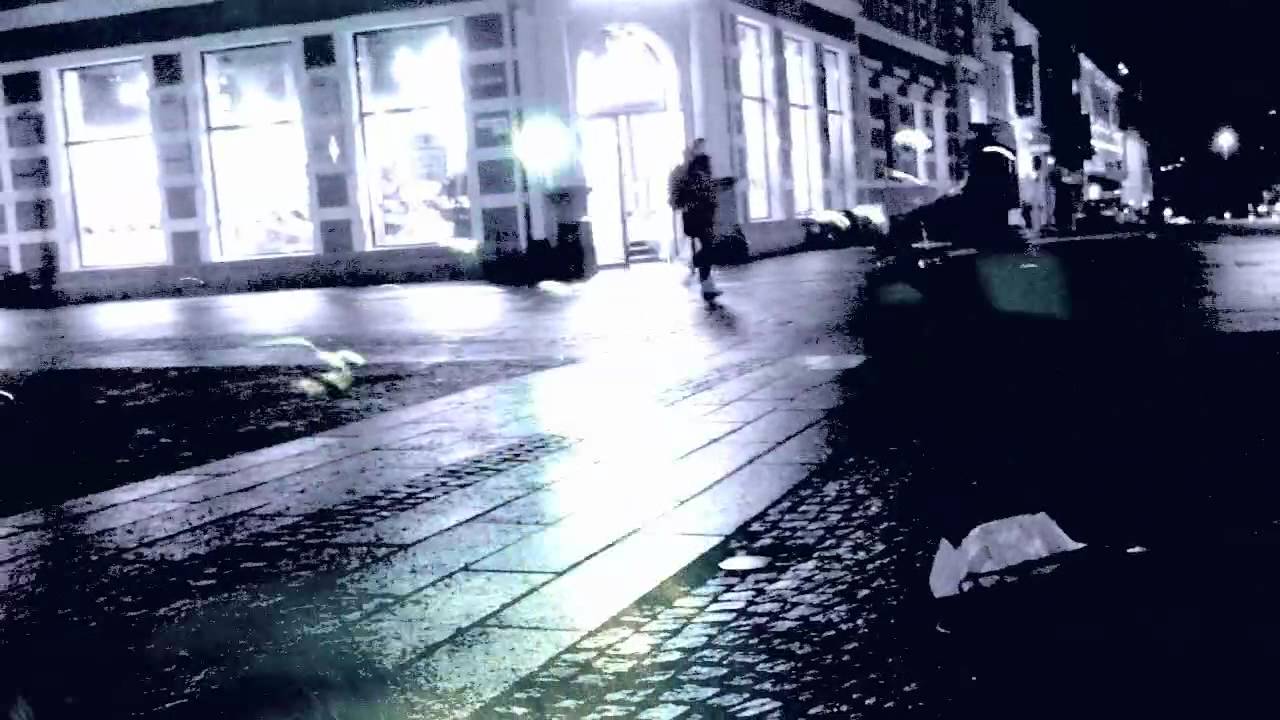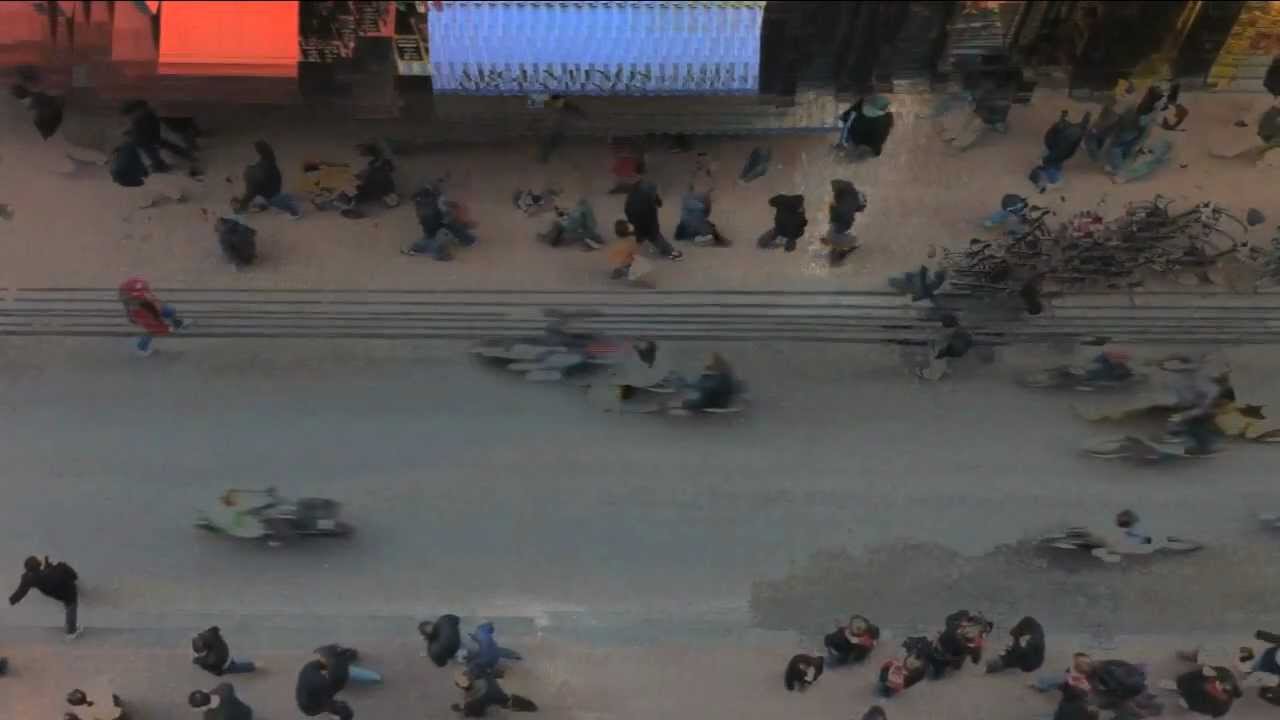To download a free copy of Necessary’s Galgeberg/Gimle click here
It’s hard to parse what’s going on when you listen to Necessary’s new album Galgeberg/Gimle. And not just on the first play either, but on the tenth or the fifteenth as well. On hearing the first side of this double album you encounter heavy breaks, turntablism, bass music, hauntological synth work, drum and bass, hip hop, chopped and screwed rap, industrial, choral and funk, but this is no zany Ween-style parade of pastiche or uptight muso muscle flexing session. Not only are all these styles played with an intimacy that gives lie to any suggestion of dilettantism, but they are combined in surprising, provocative and unsettling ways.
The song ‘Well Ov Initiation’ has what initially sounds like occult chanting over guitar and synth noise, which becomes augmented by a female Persian folk singer and modern choral music that sounds like it could have been written by György Ligeti. On one level this is grandly gothic dance music and points to (Necessary’s electronics expert) Tony F. Wilson’s involvement with the Dausteg movement in Oslo along with Are Mokkelbost. This short-lived scene, aka deathstep, has since been co-opted by men in school massacre leather trenchcoats and odd coloured contact lenses who dream of going to the crusty cyber rave in The Matrix Reloaded, but initially sought to find common ground between grime, hip hop, black metal and doom. (Tony expands on his theories on the similarities between true Norwegian black metal and gangsta rap on the Quietus here.)
But on repeated listening, what could have been a recording of some Norwegian in corpse paint chanting about baphomets actually reveals itself to be a chopped and screwed recording of a Spanish language speaking historian, talking about the Spanish/Peruvian War of the 19th Century, contrasted with Macedonian orthodox choir music and a Masonic title. This is not only forward looking music – there are elements of dubstep and juke to the rhythm bed of this dark track – but backward looking as well: in the sense that Necessary are clearly a group who acknowledge the truism that those who are not aware of their history are destined to repeat it. In fact, the amount of spoken word on this album reveals it to be also part political provocation/statement.
Personally, I found Galgeberg/Gimle to be a bit of a mad man’s breakfast when I first heard it. I could tell that it was skilfully made, but found it too all over the place to penetrate initially. However, a month later, I love it. I’m now used to hearing Chilean rapping next to pulverising witch house and tweaking acid/industrial, and recognize it for what it is: brave and exciting new music.
Can you introduce the band: Who is in it? What do they play? What are their backgrounds?
Tony Wilson: Necessary at present consists of Andreas Mork, Matti Hansen, Salvador Sanchez, Ted Parsons and me. Matti’s the core member, and his background includes a stint in the Norwegian darkwave band Horsemen. The role of individual members varies from track to track but generally speaking Matti is responsible for all guitars (bass and lead) but also contributes on production. Andreas handles programming and producing, Salvador does vocals, keyboards and programming. He has a successful solo rap career in Norway and previously recorded in the group Dark Side of The Force along with his brother Oscar Sepulveda. Our drummer Ted has played in Swans, Prong, Godflesh, Foetus, Buckethead and Jesu and continues to be a much in demand drummer for myriad experimental projects the world over. I play keyboards, programming, turntables/samples and do production.
This is what I’d call a completely sui generis album, and the Necessary net has been cast far and wide. What genres does the album cover in total?
TW: Thanks very much. I think the genres covered are basically everything that we’re interested in, which would include hip-hop, dub, goth, world music, drum & bass, ambient techno and industrial. I guess I should invent a catch-all term like Post-Dictatorial Troll-Hop, but I hope to still be making music in a year.
How difficult is it to combine these genres without it sounding like a chaotic mess?
TW: I think some would argue that it is a chaotic mess, and in many senses they’d be right. Many of my more puritanical techno friends in London used to describe hardcore and jungle as such, so I don’t see it as necessarily a bad thing. It wasn’t difficult, as every track on Galgeberg/Gimle began as a jam. The hard part was making sense of everything, thus the process of editing and producing was kind of like assembling a jigsaw.
I believe the fact that you’re a multi-racial/international band is important to the various members of Necessary. Can you explain why this is and to what extent you see yourself breaking down barriers between traditionally white and black forms of music… if that is what you’re doing at all?
TW: To be honest we never really thought it was that big a deal until the tragic events of July 2011 in Oslo and on Utøya. More recently, immigrants have been scapegoated by politicians and certain aspects of the media for attacks on women, which has all but extinguished the tolerant rhetoric that followed the massacre. Also in the North of the country, there has been a worrying trend towards resentment and disrespect of the Sammi population. The last year has really made me feel like an immigrant more than any other time in the six years I’ve been here.
We’re not consciously trying to break down barriers, and I personally don’t think we’re doing anything that Rick Rubin, Adrian Sherwood or Kurtis Mantronik hasn’t done 30 years ago; all of whom are huge influences on my part in Necessary. I think to not draw on our various backgrounds would be dishonest. It’s also about being true to our age and influences. No one needs another 40 year old in a New Era cap making brostep.
What do Galgeberg and Gimle mean?
TW: Galgeberg translated into English is Gallows Mountain. It lies on the east of Oslo and is a famously working-class area. Gimle is part of Frogner on the very affluent West Side but has dark connotations, because it was also the name of Nazi collaborator Vidkar Quisling’s villa which he held in Bygdø, also on the West Side. The east side of Oslo holds most of the city’s immigrants whereas the west is comparatively untouched. The idea is that Galgeberg reflects this by being more urban sounding with Eastern overtones, whereas Gimle has more Northern European influences. There’s some overlap, but that was the general idea.
Can you tell me where the spoken word samples came from?
TW: The spoken word samples on ‘Well Ov Initiation’ come from a record that belongs to Salvador about the Spanish-Peruvian War of the 19th Century. It originally belonged to his Chilean father who had to bury such overtly political records in his garden with the advent of the Pinochet regime. The idea of slowing down the voices came partly from reading about the practice of Monterrey Mexicans slowing down cumbia records, but mainly because it sounded downright evil. The choir used on the same track came from an album of Macedonian Church music that Ted brought back from a holiday in Greece. So even though it may sound overtly evil, ‘Well Ov Initiation’ is actually the complete opposite.
However, the Templar association of the title has taken on a sinister dimension because of Anders Behring Breivik’s obsession with the military order. We actually thought about not only changing that title but also our moniker because of Brevik’s infamous "grusome but necessary" quote. We didn’t want to be seen as exploitive but we decided that as we had already released Voldsløkka as Necessary in 2010, people would understand that we’re not trying to be Taake.
Another spoken word sample is an interview with Yasser Arafat during the first Gulf War that just seemed to really resonate with current world events. This appears throughout ‘No Peace Price Dub’.
For the end of ‘Ivppitter’ we used part of an interview with a survivor of the Jonestown Massacre. It sounds very innocent, like the sample of Ricky Lee Jones voice on ‘Little Fluffy Clouds’ but is obviously something far more disturbing. The idea was directly inspired by the Death in June album But What Ends When The Symbols Shatter, which has gospel songs from the Jim Jones’ People’s Temple Choir, reinterpreted as spine chilling neofolk.
In terms of global reach and the pairing of unlikely genres the album reminds me of the very utopian My Life In The Bush Of Ghosts – despite not really sounding like it – are you interested in combining high and low forms, mixing avant garde with populist, dance music with armchair music, Western with Eastern? How do you ensure such clashes don’t sound either messy or dilettantish?
TW: I take that as a massive compliment, thank you. This story usually comes up when I’m drunk, but I first heard My Life In The Bush of Ghosts on my 21st birthday at Martin Gore’s flat. I had a friend called Paul Valentine who was signed to Mute for a time in a band called Spirit Feel, and we shared the same birthday. After I rang to congratulate him he invited me round to his. What he neglected to tell me was that he shared a flat with Gore. When I arrived it was the morning after a massive party they’d had the night before. I’ll skip details but Martin put on Bush Of Ghosts and it completely blew my mind. So yeah, that album has been a massive influence ever since.
The mixing of high and low culture, populist/dancefloor etc is very much the theme of Dausteg, my DJ partnership with Are Mokkelbost, but I think it informs everything I do. Not in some lame ‘I love Glee and DJ Screw equally’ type way that seems popular at the moment, but because I’m British and there’s something very unique about our openness about mixing musical styles. Jungle is one obvious example but it goes back much further, early New Order covering Keith Hudson (on their first Peel Session) for instance. It’s also partly a love of Detroit techno and early Chicago house – the fact that these guys were from poor black cities in America and making essentially darkwave or EBM records that were, up until then, only the preserve of sophisticated white Europeans or rich Texan Republicans going to the Starck Club. I thought exactly the same thing was happening when I first heard grime instrumentals that sounded like early industrial music but those guys were oblivious to Throbbing Gristle and DAF, whereas the Detroit and Chicago guys knew exactly who they were.
The East meets West thing I think was partly mirroring what was going on with the Arab Spring, and also because we wanted to reflect Galgeberg and the East side of Oslo, which has a large Muslim population. I listen a lot to artists like Ahmed Fakroun from Libya and to compilations of rare Middle Eastern stuff like Choubi! Choubi! on Sublime Frequencies and the Finders Keepers Pomegranates collection, but I didn’t want to replicate them so much, as it would be a bit fraudulent. It’s coming more from stuff like The Residents, Dead Can Dance, Cabaret Voltaire’s ‘Yashar’ or ‘Evil Dust’, an instrumental remix of New Order’s ‘Angel Dust’.
Do you think that the MP3 has ushered in a brave new world where everyone listens with open ears, or are we really as conservative about genre boundaries as we were before?
TW: I think for a while it was kind of fashionable to have this blinkered dedication to genres, people only listening to Norwegian metal or techno from Berlin. But I think we’re now entering a phase where it’s more attractive to express knowledge of everything. Fenriz of Darkthrone is a really good example; he just dropped an amazing techno mix for VICE, Snoop Dogg just did a pretty OK house mix.
No artists like being pigeonholed. Even people in bands like the Editors or Arctic Monkeys like to think of themselves as somehow undefinable – but is playing music inventively inside a genre necessarily such a bad thing?
TW: I don’t see genres as so much of a problem as when they become scenes. For example, a few years ago you had bands like Khanate, Nadja and Black Boned Angel just doing their thing independently and then some tit came up with drone metal or art metal, and then every frustrated post-rock or noise musician goes ‘Oh, I’ll have a go at that.’ Dubstep is obviously another example. It was so much better when people didn’t know whether to call it sub-lo, eski, 8-bar or grime. I think there’s a problem at the moment with blind reverence for certain metal related musicians who think they can conquer any genre, when they’re really much better at having a singular focus. That’s why I have respect for someone like Kevin Martin because he has a better music knowledge than most people, but has channeled it all through this mad dancehall prism. I don’t like everything he does, but when he’s good he’s really good.
To what extent have you shot yourself in the foot (commercially not artistically) by producing such an "eclectic" album? I was trying to think of who I could recommend this to and outside of us and VICE I was struggling a little…
TW: I think how eclectic the album sounds is very relative. We personally don’t think it is that eclectic but then I guess we are influenced by people or records that are, so it’s just come out that way. We’re having a very hard time trying to get a UK distributor so in that regard, maybe we have shot ourselves in our collective feet. But we didn’t set out to make some difficult cross-genre record.





